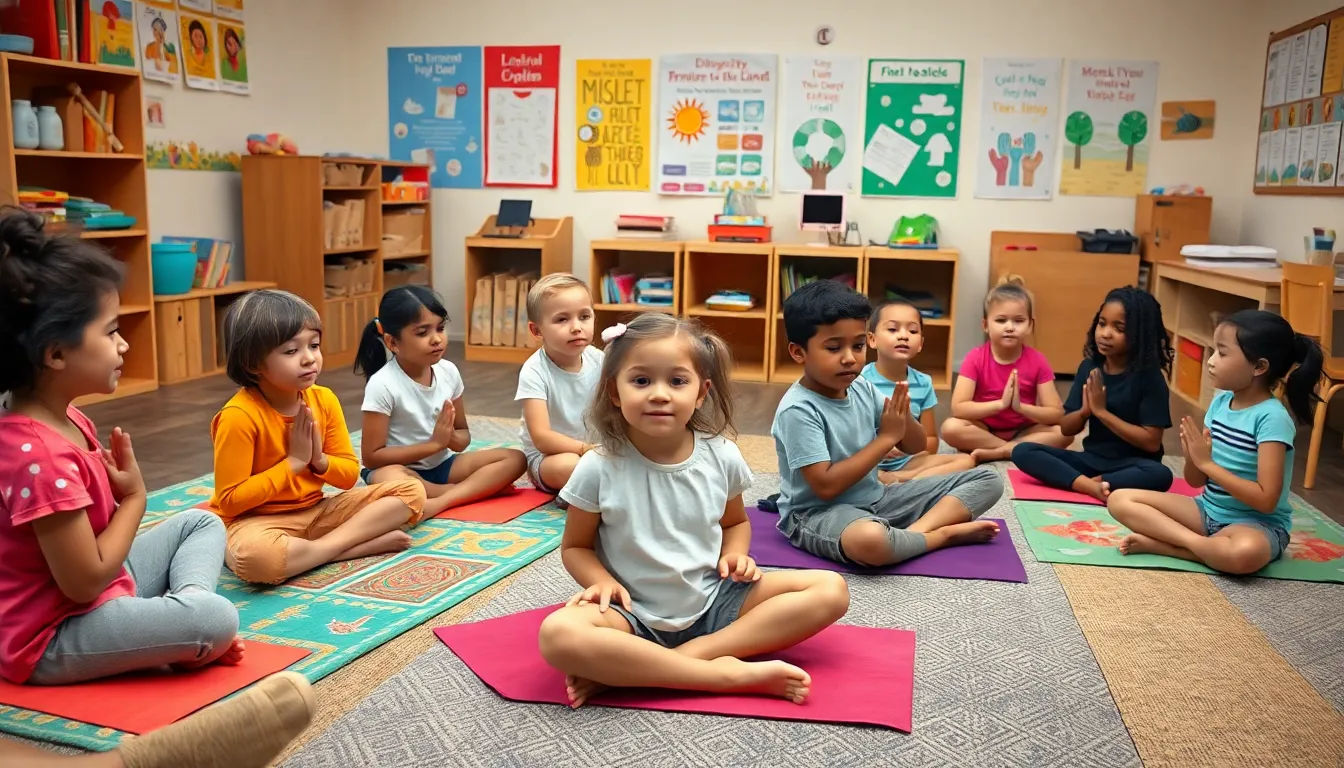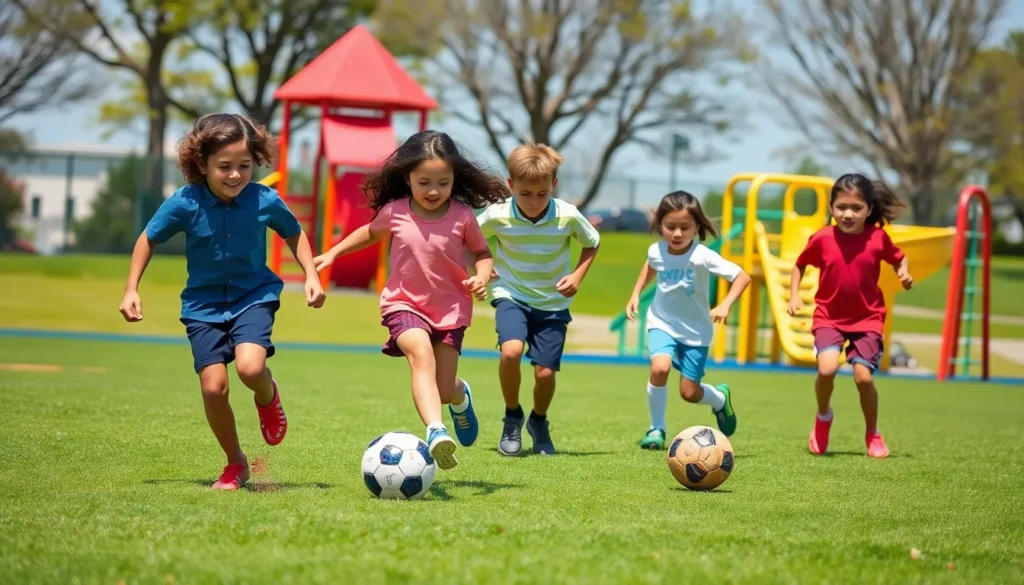In today’s fast-paced world, children face unique challenges that can impact their emotional and mental well-being. Understanding and equipping them with the right psychological tools can make a significant difference in their development. These tools not only help kids navigate their feelings but also foster resilience and promote healthy coping mechanisms.
From mindfulness techniques to cognitive-behavioral strategies, parents and educators can play a crucial role in introducing these tools early on. By empowering children with the skills to manage stress and anxiety, they can build a strong foundation for a balanced and fulfilling life. This article explores various psychological tools designed specifically for children, aiming to enhance their emotional intelligence and overall mental health.
Table of Contents
ToggleOverview of Psychological Tools for Children
Psychological tools help children navigate their emotions and enhance their mental health. Various techniques assist in building resilience and emotional intelligence.
Mindfulness Practices
- Breathing exercises: Deep breathing can ground children during stressful moments.
- Meditation: Short sessions teach children focus and inner calm.
- Body scans: These raise awareness of physical sensations and promote relaxation.
Cognitive-Behavioral Techniques
- Identifying thoughts: Children learn to recognize negative thinking patterns.
- Reframing thoughts: This technique helps shift perspectives from negative to positive.
- Goal-setting: Establishing achievable goals teaches kids to break challenges into manageable steps.
Social-Emotional Learning (SEL)
- Emotional regulation: Children learn to express and manage their emotions effectively.
- Empathy training: These strategies enhance understanding of others’ feelings.
- Conflict resolution: Skills in resolving disagreements promote cooperation and positivity.
Play Therapy
- Art therapy: Engaging in creative activities allows children to express feelings non-verbally.
- Role-playing: Acting out scenarios lets kids explore emotions and solutions.
- Sand tray therapy: This uses miniature figures and environments to facilitate communication and expression.
Positive Reinforcement
- Praise and rewards: Recognizing achievements encourages desired behavior.
- Clear expectations: Clear guidelines support children in understanding boundaries.
- Consistent feedback: Regular feedback helps children learn and grow in a supportive environment.
Incorporating these tools into children’s daily lives promotes healthier coping strategies, psychological resilience, and overall well-being.
Importance of Psychological Tools

Psychological tools play a crucial role in fostering children’s emotional and cognitive development. By equipping children with these tools, parents and educators create a foundation for improved mental health and resilience.
Enhancing Emotional Well-Being
Emotional well-being is vital for children’s overall health. Techniques such as mindfulness practices help children recognize and manage their emotions effectively. Breathing exercises and meditation enable children to find calm during stressful situations, promoting relaxation and self-awareness. Furthermore, social-emotional learning (SEL) strategies teach skills like empathy and emotional regulation. Role-playing and art therapy provide creative outlets for self-expression, allowing children to articulate feelings and experiences. The positive reinforcement of desired behaviors through praise and consistent feedback encourages children to build a positive self-image and cope better with challenges.
Supporting Cognitive Development
Cognitive development is essential for children’s learning and problem-solving abilities. Cognitive-behavioral techniques foster skills such as identifying and reframing negative thoughts, enhancing critical thinking. Setting achievable goals promotes a sense of agency and motivation. Children gain tools for effective decision-making, which contributes to their academic success and personal growth. Integrating play therapy methods, such as sand tray therapy, offers children opportunities to explore complex thoughts in a safe environment. These methods stimulate cognitive processes and reinforce the connection between emotional health and cognitive capabilities, contributing to holistic development.
Types of Psychological Tools for Children
Various psychological tools assist children in managing their emotions and enhancing mental well-being. These tools encompass therapeutic games, interactive apps and software, and assessment tools.
Therapeutic Games
Therapeutic games serve as engaging methods for children to explore their emotions and behaviors. These games encourage cooperation, problem-solving, and coping strategies. Examples include board games that promote emotional expression and role-playing games that simulate real-life scenarios, helping children navigate social interactions. Research indicates that play can facilitate emotional processing and foster interpersonal skills, contributing to emotional intelligence.
Interactive Apps and Software
Interactive apps and software present innovative ways for children to develop psychological skills. These digital resources often include mindfulness exercises, emotional check-ins, and cognitive-behavioral techniques. For instance, apps like Calm or Headspace offer guided meditations tailored for kids. Studies show that integrating technology into mental health practices can enhance engagement and encourage daily practices that support emotional regulation.
Assessment Tools
Assessment tools provide structured approaches to understand and evaluate children’s emotional and cognitive needs. These tools, such as questionnaires and observational checklists, help identify areas for growth and guide interventions. Validated instruments like the Strengths and Difficulties Questionnaire (SDQ) offer reliable measures of emotional and behavioral functioning. Employing these assessment tools enables parents and educators to create personalized support strategies, fostering children’s mental health and resilience.
Implementing Psychological Tools at Home and School
Implementing psychological tools at home and school involves strategic methods tailored to enhance children’s emotional and mental well-being. Parents and educators play pivotal roles in integrating these tools into daily routines.
Strategies for Parents
- Practice Mindfulness: Encourage mindfulness through daily routines. Activities like mindful breathing, yoga, or quiet time outdoors foster awareness and emotional regulation.
- Promote Open Communication: Create a safe space for children to express feelings. Encouragement of dialogue about emotions helps them articulate thoughts and challenges.
- Utilize Positive Reinforcement: Reinforce positive behaviors with praise and recognition. This builds self-esteem and encourages children to replicate desired actions.
- Introduce Goal-Setting: Guide children in setting realistic, achievable goals. Discuss progress regularly, helping them understand the importance of perseverance and achievement.
- Incorporate Play Therapy: Use play as a therapeutic tool. Engage in activities like drawing or creating stories together to facilitate emotional expression.
Tips for Educators
- Implement Social-Emotional Learning (SEL): Integrate SEL curriculum components into classroom activities. Teaching children empathy, conflict resolution, and emotional regulation enhances their interpersonal skills.
- Use Cognitive-Behavioral Techniques: Incorporate exercises to identify and reframe negative thoughts. Activities around cognitive restructuring develop critical thinking and resilience.
- Foster a Supportive Environment: Create an inclusive classroom atmosphere. Promote cooperation and collaboration among students to enhance emotional safety.
- Regularly Assess Emotional Needs: Utilize assessment tools, such as checklists or observations, to identify children’s emotional states. Tailor support strategies based on individual needs.
- Engage with Creative Therapy Methods: Utilize art therapy and role-playing within the curriculum. These methods allow children to explore feelings creatively and build confidence.
Challenges and Considerations
Implementing psychological tools for children involves several challenges and considerations. Recognizing these hurdles helps parents and educators create effective strategies for emotional and mental support.
- Developmental Appropriateness: Psychological tools must align with children’s developmental stages. Tools suitable for one age group may not resonate with another, resulting in frustration or confusion.
- Individual Differences: Each child has unique emotional and cognitive needs. Tailoring tools to fit individual differences ensures greater effectiveness and engagement.
- Consistency in Practice: Consistent application of psychological tools reinforces learning. Inconsistency can hinder children’s ability to develop resilience and effectively manage emotions over time.
- Parental and Educator Involvement: Active participation from parents and educators is crucial. Training and resources for these adults enhance the implementation of psychological tools in home and school settings.
- Cultural Sensitivity: Understanding cultural backgrounds influences the choice and usage of psychological tools. Tools should respect cultural values and communication styles to resonate with children and their families.
- Accessibility: Availability of resources may vary across different communities. Ensuring access to psychological tools helps bridge gaps and supports all children in need.
- Monitoring Effectiveness: Regularly assessing the impact of psychological tools helps identify adjustments needed for individual children. Continuous evaluation promotes improvement in their emotional and mental health outcomes.
- Integration into Daily Life: Encouraging the integration of psychological tools into everyday routines enhances their effectiveness. Practical application fosters habit formation and skill retention in children.
Equipping children with psychological tools is essential for their emotional and mental development. By incorporating techniques like mindfulness and cognitive-behavioral strategies, parents and educators can create supportive environments that foster resilience and emotional intelligence. These tools not only help children manage stress and anxiety but also promote overall well-being.
As children learn to navigate their emotions through creative methods like play therapy and art, they build a strong foundation for future growth. The integration of social-emotional learning into daily routines further enhances their ability to connect with others and resolve conflicts. Prioritizing these psychological tools will empower the next generation to thrive in an increasingly complex world.





